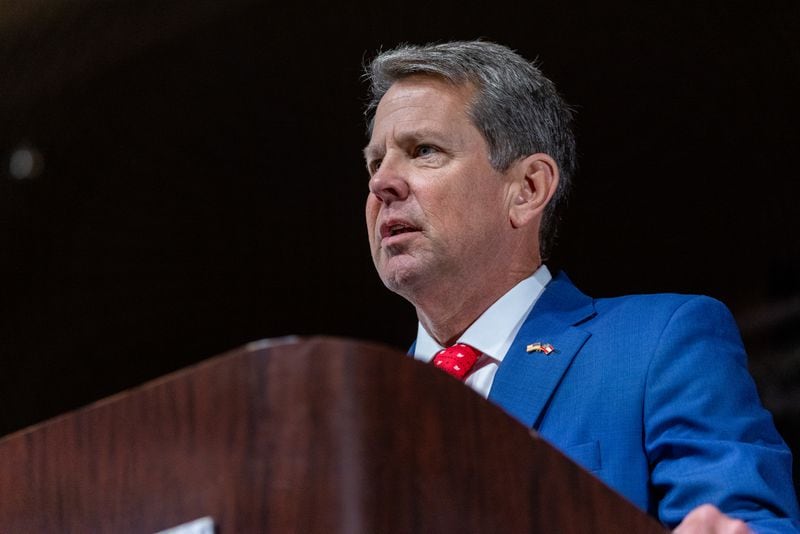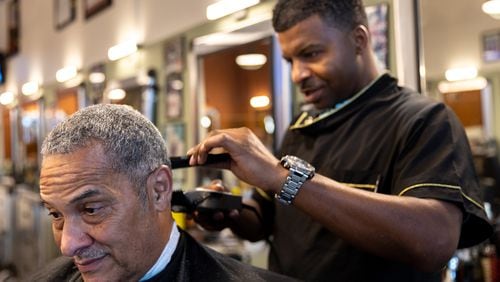Timing, price of purchase prompt call for investigation
Sonny Perdue’s prospects of new employment as head of the University System of Georgia grew cloudy this past week after The Washington Post reported that he had benefited from a remarkable business deal.
The Post reported that the former Georgia governor, just weeks after then-President Donald Trump picked him to be the U.S. secretary of agriculture, acquired a grain plant from one of the nation’s biggest agricultural firms at a fraction of its value.
A firm that Perdue owned, AGrowStar, paid $250,000 to Archer-Daniels-Midland to take possession of the plant in Estill, South Carolina. Six years earlier, ADM paid more than $5.5 million for the same land, a figure much closer to estimates that independent analysts gave after reviewing the records for the Post.
Perdue was not legally required to disclose the deal, which the Post uncovered through a review of records.
An ADM spokeswoman denied that the company sold the property at a discount and said negotiations began long before Trump chose Perdue for a spot in his Cabinet. She said the company couldn’t find another buyer other than AGrowStar.
Still, the timing of the acquisition raised legal and ethical concerns with a former federal prosecutor that the Post contacted. Julie O’Sullivan, now a law professor at Georgetown University, said the deal “stinks to high heaven” and should be investigated to determine whether there was any quid pro quo.
Following up on the Post report, the chairwoman of the U.S. Senate Agriculture Committee, Debbie Stabenow of Michigan, also called for an investigation.
Perdue did not respond to repeated requests for comment from the Post, and he also did not comment immediately to The Atlanta Journal-Constitution.
Several members of the Board of Regents, which oversees Georgia’s higher education system, also declined to comment.
The Post report adds a new level of complication to what has already been a tricky situation concerning Perdue’s pursuit of the job as chancellor of the University System.
The regents voted in June to appoint an interim chancellor, temporarily delaying Perdue’s hopes of landing the coveted, high-paying job.
Perdue supporters, including some close to Gov. Brian Kemp, say he’s a strong candidate for the job of chancellor because of his administrative experience, not only as governor for eight years but also as head of the U.S. Department of Agriculture, a federal agency with an annual budget of roughly $140 billion.
But the prospect of Perdue leading the state’s public colleges and universities has also generated plenty of criticism. Some say a veteran administrator with university experience is needed for the job, not a powerful former politician.
A regional accrediting agency even warned that the system could be found “out of compliance” if the process for selecting a new chancellor is politicized. Such a finding could make it harder for students to qualify for federal aid and transfer to other colleges.
State Sen. Jen Jordan, a Democratic candidate for attorney general, said the Post’s report, combined with that warning, makes Perdue’s candidacy a “recipe for disaster.”
“The accreditation of our entire university system could be at stake if Perdue is appointed,” she said. “This is a gamble we cannot take.”
Is Walker running? He promises a decision soon
Donald Trump says Herschel Walker is running for the U.S. Senate.
Walker says maybe.
“He told me he’s going to, and I think he will,” Trump said this past week on “The Clay Travis & Buck Sexton Show.” “I had dinner with him a week ago. He’s a great guy. He’s a patriot. He’s a very loyal person.”
Walker followed up the former president’s comments by saying he will make a final decision soon.
“Know this much: If I run, I’ll be all-in, and we will do whatever it takes to win for Georgia,” Walker said in a statement.
Trump has long encouraged Walker to run in next year’s election for the seat held by Democrat Raphael Warnock, and other Republicans have put their plans on hold while they wait for the University of Georgia football legend to announce his intentions.
If Walker chooses to run, Trump’s support will make him the front-runner in the GOP primary. Still, Walker would face some obstacles. First, he’d have to move back to Georgia after living in Texas for many years.
He also would have to sell himself to some conservatives who don’t know his political leanings, put together some policy positions and commence fundraising. There also would be some scrutiny into his past, including struggles with mental illness.
While the waiting game continues, three other Republicans have entered the race, Georgia Agriculture Commissioner Gary Black and two military veterans — Kelvin King and Latham Saddler.
Another potential candidate is former U.S. Sen. Kelly Loeffler, who lost to Warnock in a January runoff. She has maintained high visibility by creating Greater Georgia to help turn out Republicans at the polls. She recently met with U.S. Senate Republican Leader Mitch McConnell and has also tried to maintain a connection to Trump.
Black, the best known of the candidates so far, has opted to play offense. This week, he released a list of more than 220 supporters representing each of Georgia’s 159 counties. Among the backers: Fulton County Commissioner Bob Ellis; Georgia Public Service Commissioner Tricia Pridemore; Banks County Sheriff Carlton Speed; Douglas County Sheriff Tommy Waldrop; and about a dozen state legislators and former state legislators.
Meanwhile, Warnock will continue to consolidate support from Democrats and build his campaign fund. Earlier this year, he reported raising nearly $6 million in campaign donations. A new set of disclosures will be coming soon.
Credit: Nathan Posner
Credit: Nathan Posner
Panels named to consider how to spend COVID-19 money
Gov. Brian Kemp took a big step this past week in determining how Georgia will spend its share of the latest round of federal funding for COVID-19 relief, about $4.8 billion.
Kemp named lawmakers and agency leaders to three committees that will then recommend how to use the state’s share of a $1.9 trillion package President Joe Biden signed into law in March.
The state has already received half the money, with the rest coming next year.
State agencies, local governments, industries and nonprofits will be eligible to apply for grants between Aug. 1 and Aug. 31 at opb.georgia.gov. Under state law, Kemp will make the final decision on where that money will go, and announcements are expected to come in mid-October.
The money coming to Georgia can be used broadly for COVID-19 response, including making direct payments to Georgians, providing aid to small businesses and giving extra pay for “essential workers,” as well as funding infrastructure projects.
But the topic areas assigned to each committee indicate what types of projects will win favor. One will deal with economic impact, a second with broadband expansion and another with water and sewer infrastructure.
Billions more in cash is coming to Georgia through the relief package, but it will go directly to Georgia cities and school districts.
Kemp may be recycling 2018 playbook
Through a few moves he made this past week, Gov. Brian Kemp may have tipped his hand about his reelection strategy.
It’s looking like another run through his 2018 playbook for the governor’s race, when he — like Donald Trump in the 2016 presidential election — won by piling up huge margins in Georgia’s rural areas while cutting into Democratic leads in the state’s urban centers.
This past week, Kemp named 20 legislators, Republicans and Democrats, to the committees that will recommend how to spend the $4.8 billion the state is receiving in the new round of COVID-19 relief money. Even though about half the state’s population lives in metro Atlanta, only two of those legislators come from the region’s five core counties. Not a one claims the city itself as home.
Kemp also announced that he will stage the statewide kickoff of his reelection campaign July 10 at the Georgia National Fairgrounds in Perry. That makes for a nice nod to agriculture, Georgia’s largest industry, and the rural counties that make it run.
Each election provides a new test for the rural strategy as the population continues to slip in rural areas.
That’s one reason the expansion of high-speed internet access — particularly in rural Georgia — has been a prime issue for discussion at the General Assembly during recent sessions.
All that talk, however, has yet to come up with a way to pay for it without raising taxes and fees.
Confederate statue vote divides Georgia delegation
The Civil War remains as polarizing as ever.
Georgia’s U.S. House delegation split along party lines this past week on a vote to remove statues from the U.S. Capitol that honor Confederate leaders.
That includes Georgia’s statue of Alexander Hamilton Stephens, the vice president of the Confederacy.
The measure passed on a vote of 285-120 with Democrats joined by about one-third of the Republican caucus. None of those Republicans came from Georgia, although two — U.S. Reps. Buddy Carter of Pooler and Jody Hice of Greensboro — did not vote.
U.S. Rep. Barry Loudermilk helped lead opposition to the legislation. He said that while he agreed there were statues in the building of people he did not believe should be honored — he didn’t go as far as naming any of them — he had a problem with the method taken.
“I have fought for a long time to remove those,” Loudermilk said, “but I am in opposition to the process of which we’re trying to impose to do this.”
Stephens may be best known for giving what’s called the “Cornerstone Speech,” saying in 1861 that the conflict over slavery “was the immediate cause” of the Civil War — not states’ rights — and asserting that enslavement is the Black man’s “natural and normal condition.”
The Stephens statue has a prominent position in Statuary Hall inside the Capitol.
A bill before the General Assembly would replace the Stephens statue with one of the late U.S. John Lewis, but the measure hit a wall in the state House earlier this year.
The federal legislation now heads to the U.S. Senate, but it’s uncertain whether it will get a vote. Even if it does, it may not get enough GOP support to overcome a filibuster.
Congressional panel to examine Georgia voting law
The U.S. Senate Rules Committee hasn’t held a field hearing in 20 years, but that will end later this month when it comes to Georgia to hear testimony about the state’s election overhaul, Senate Bill 202.
The chair of the committee, Democratic U.S. Sen. Amy Klobuchar of Minnesota, announced that the hearing will be held July 19 in Atlanta.
“At the hearing, witnesses will testify about recently enacted legislation to restrict voting in the state and the need for basic federal standards to protect the freedom to vote,” Klobuchar said in a statement.
Georgia U.S. Sen. Jon Ossoff is a member of the committee, which oversees legislation related to voting and elections. That means it would have a hand in the outcome of two election bills currently working their way through Congress.
One is the For the People Act, which would involve a wide range of voting issues, including automatic registration and national standards for mail-in and absentee ballots.
The other is the John Lewis Voting Rights Act, named for the late U.S. representative from Atlanta. It would, among other things, restore preclearance — meaning states would have to run any changes in state or local election procedures by the civil rights division of the U.S. Justice Department. Preclearance originally applied only to Georgia and several other states with histories of suppressing the African American vote until the U.S. Supreme Court struck it down in 2013. Democrats, largely, now say it should apply to all states.
Candidates, endorsements, etc.:
— State Sen. Tyler Harper of Ocilla announced that he is running for agriculture commissioner. He’s the first prominent Republican to enter the race to succeed Gary Black, who chose to run in the GOP primary for the U.S. Senate. Democrat Nakita Hemingway, who lost a suburban Gwinnett County legislative race last year, is also in the running for the ag post to help shape policy concerning Georgia’s leading industry.
— Rudy Giuliani, the onetime mayor of New York and ex-lawyer for former President Donald Trump, attended a fundraiser for Vernon Jones, the former Democrat now running against Gov. Brian Kemp in the GOP primary. Giuliani and Jones also held a joint press conference.
— Former Gov. Nathan Deal and former U.S. Sens. Saxby Chambliss and Johnny Isakson co-hosted a fundraiser for Georgia Attorney General Chris Carr’s reelection bid. Isakson, who retired from the Senate in 2019 for health reasons, didn’t attend the event. Two Democrats are campaigning to replace Carr — state Sen. Jen Jordan and former prosecutor Charlie Bailey. It’s Bailey’s second effort after capturing nearly 49% of the vote in the 2018 contest against Carr.
— Andrew Young, a former mayor of Atlanta and ambassador to the United Nations, is backing state Rep. Derrick Jackson’s bid for lieutenant governor. Jackson is running against state Rep. Erick Allen for the Democratic nomination. On the Republican, the candidates, so far, are GOP activist Jeanne Seaver and state Senate President Pro Tem Butch Miller, who drew a couple of big names to his kickoff even this past week in Gainesville: former Gov. Nathan Deal and former U.S. Sen. David Perdue.
About the Author









